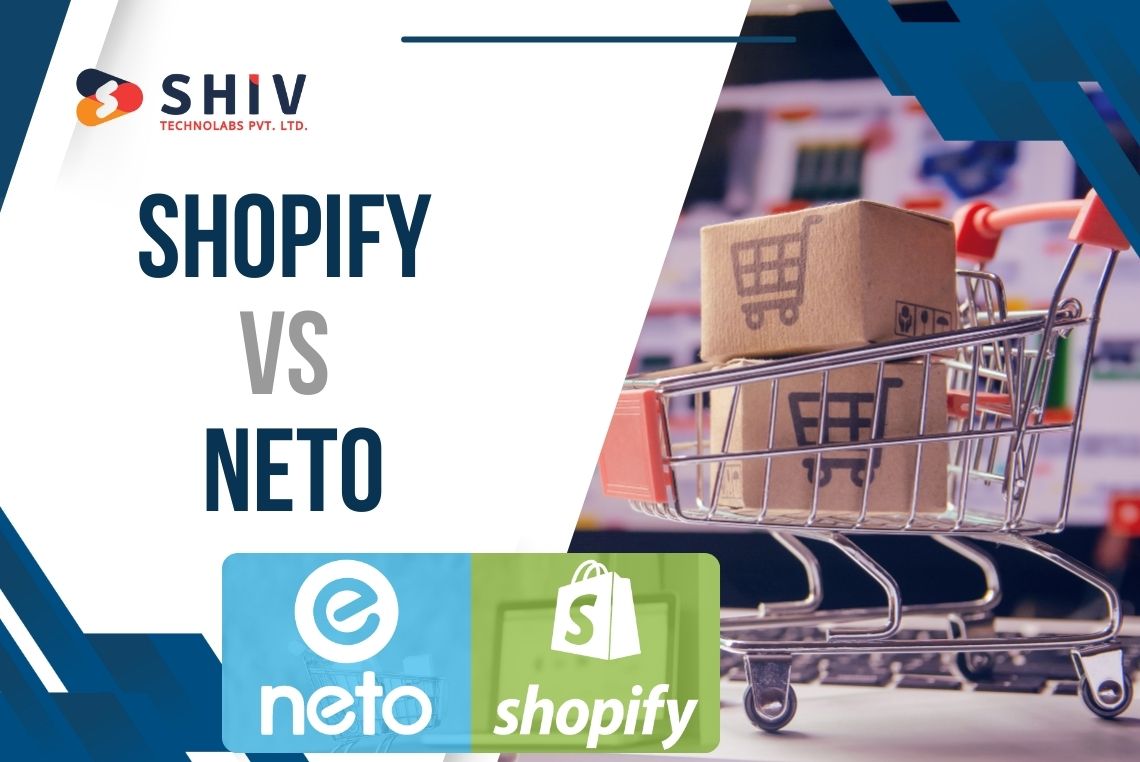Table of Contents
The eCommerce landscape is filled with platforms that cater to a wide range of businesses, but Shopify and Neto are two that stand out. Shopify, with its global presence and extensive features, offers a versatile solution, while Neto focuses primarily on the Australian market, catering to local needs. In this detailed comparison, we’ll look at both platforms across several key areas to help you determine which one is better suited for your business.
What is Shopify?

Shopify is one of the most well-known eCommerce platforms in the world. Launched in 2006, it is a cloud-based solution designed to help businesses of all sizes create, customize, and manage online stores. Shopify is renowned for its user-friendly interface that allows non-technical users to set up an online store quickly. The platform provides a wide array of customizable themes, robust integrations, and supports multiple payment gateways, offering flexibility to both small businesses and large enterprises.
Shopify’s scalability makes it an ideal solution for businesses at various stages of growth. It offers plans ranging from basic to Shopify Plus, which is designed for larger, high-traffic online stores. Its app ecosystem and third-party plugins further extend its capabilities, allowing businesses to tailor the platform to their specific needs.
What is Neto?
Neto is an Australian-based eCommerce platform that provides businesses with a comprehensive suite of tools for online, in-store, and wholesale selling. Founded in 2009, Neto is particularly well-suited for local businesses due to its strong focus on Australian tax laws, shipping regulations, and payment systems. The platform is designed to simplify the process of selling across multiple channels, including online stores, marketplaces like eBay, and in-person sales.
While Neto may not have the same global recognition as Shopify, it stands out for its localized support, offering Australian businesses tailored solutions with features that align closely with local requirements. Neto’s focus on multi-channel retailing makes it a strong contender for businesses that want to manage both online and offline sales from a single platform.
Also Read:- Shopify vs Magento: Which Ecommerce Platform Is Right for You?
Product Management: How Both Platforms Handle Inventory

Managing inventory efficiently is critical to the success of any eCommerce store. Both Shopify and Neto offer robust inventory management features, but there are some notable differences in how they handle this aspect of business operations.
Shopify’s Inventory Management: Shopify allows users to manage their inventory through a simple yet powerful interface. Businesses can add products, set inventory tracking, and manage stock levels across multiple locations. Shopify’s platform integrates with a wide range of third-party inventory management apps, which provide additional functionalities such as forecasting, purchase orders, and multi-warehouse management.
Shopify also allows users to create collections and product variations (e.g., different sizes and colors), which is particularly useful for businesses with a diverse range of products. The platform offers automatic stock updates for products sold across various sales channels, ensuring that stock levels are always accurate.
Neto’s Inventory Management: Neto’s approach to inventory management is designed to cater to multi-channel retailers. The platform allows businesses to manage inventory across multiple sales channels, including online stores, marketplaces, and brick-and-mortar shops, all from a single dashboard. Neto’s platform supports advanced inventory features, such as automated reordering, batch tracking, and the ability to manage inventory at multiple locations.
A key advantage of Neto is its integrated point-of-sale (POS) system, which allows businesses to manage both online and offline sales seamlessly. The platform’s focus on multi-channel retailing makes it an excellent option for businesses looking to unify their inventory management across all their sales channels.
# Payment Options and Gateways
Both Shopify and Neto provide support for a wide range of payment gateways, giving businesses flexibility in how they process transactions. However, there are differences in the number of supported gateways and the specific options available for each platform.
Shopify’s Payment Options: Shopify supports over 100 payment gateways, including popular options like PayPal, Stripe, and Apple Pay. In addition, Shopify has its own payment gateway, Shopify Payments, which allows businesses to accept credit card payments without needing to rely on third-party providers. Shopify Payments is fully integrated into the platform, providing users with lower transaction fees and faster payouts. However, this service is only available in certain countries.
For businesses that prefer third-party gateways, Shopify imposes additional transaction fees, unless Shopify Payments is used. This could be a consideration for businesses that want to minimize fees.
Neto’s Payment Options: Neto also supports a wide variety of payment gateways, with a particular focus on options commonly used in Australia. Some of the supported gateways include PayPal, eWay, and Afterpay. Neto integrates seamlessly with local banks and financial institutions, making it a great choice for businesses that want to use local payment options.
While Neto may not support as many payment gateways as Shopify, its strong support for Australian payment methods ensures that businesses in the region have access to the most relevant solutions for their customers.
# SEO Features and Marketing Tools
Search engine optimization (SEO) is crucial for driving organic traffic to an online store. Both Shopify and Neto offer a range of tools to help businesses improve their search engine rankings, but there are differences in the depth and flexibility of their offerings.
Shopify’s SEO Tools: Shopify provides users with built-in SEO features that make it easier for businesses to improve their online visibility. These features include customizable title tags, meta descriptions, and alt text for images. Shopify also has clean URL structures and fast page loading times, which are important factors for SEO. Shopify’s app store offers a wide range of SEO-focused apps, such as tools for improving page speed, optimizing images, and generating XML sitemaps.
Shopify’s marketing tools go beyond SEO, offering integrations with popular email marketing services, social media platforms, and paid advertising channels. This makes it easy for businesses to run marketing campaigns and track performance directly from their Shopify dashboard.
Neto’s SEO Tools: Neto also offers solid SEO tools, including customizable title tags, meta descriptions, and product URLs. However, its SEO functionality is not as advanced as Shopify’s, particularly when it comes to third-party integrations and SEO-specific apps. That said, Neto’s built-in marketing tools are well-suited for businesses that want a simple, straightforward way to manage their SEO efforts.
Neto also excels in providing tools for managing multi-channel marketing campaigns, allowing businesses to synchronize promotions across online stores, marketplaces, and other sales channels. While its SEO capabilities may be slightly more limited, its multi-channel marketing features make it a strong contender for businesses with complex marketing needs.
# Mobile Responsiveness and Themes
With mobile commerce on the rise, having a responsive website is crucial for success. Both Shopify and Neto offer mobile-friendly themes, but the range and customization options differ between the platforms.
Shopify’s Mobile Themes: Shopify provides a wide selection of mobile-responsive themes, both free and paid, that are designed to look great on any device. These themes are highly customizable, allowing businesses to adjust the look and feel of their online store without requiring advanced coding skills. Shopify’s themes are also optimized for performance, ensuring fast loading times on mobile devices, which is a key factor for improving user experience and conversions.
Neto’s Mobile Themes: Neto also offers mobile-responsive themes, though the selection is more limited compared to Shopify. While Neto’s themes are functional and well-designed, they may not offer the same level of customization or variety as Shopify’s. However, Neto’s themes are optimized for multi-channel retailing, ensuring that they work seamlessly across both online stores and in-person sales channels.
Which Platform Offers Better Customer Support?
Customer support is a vital consideration for any business choosing an eCommerce platform, as technical issues or downtime can lead to lost revenue.
Shopify’s Support: Shopify provides 24/7 customer support through multiple channels, including live chat, email, and phone. In addition to direct support, Shopify also offers a comprehensive help center, forums, and community resources where users can find answers to common questions. Shopify’s support is known for being responsive and helpful, which is especially important for businesses that require immediate assistance.
Neto’s Support: Neto offers a range of support options, including phone, email, and live chat support. While Neto’s customer support is limited to Australian business hours, it is tailored specifically to the needs of Australian businesses, ensuring that users receive localized advice and assistance. Neto also has a dedicated help center and a community forum where users can share tips and best practices.
# Which platform wins?
When deciding which platform—Shopify or Neto—wins, it ultimately comes down to your business’s specific needs, location, and goals. Both platforms offer a range of powerful features, but they serve slightly different types of businesses.
Shopify Wins If:
You’re a Global Business: Shopify’s wide reach and support for multiple currencies, languages, and international payment gateways make it ideal for businesses that target a global audience.
Scalability is Important: Shopify’s plans range from basic to advanced, meaning it can grow with your business as you expand. Its app ecosystem and third-party integrations offer limitless possibilities for customization.
You Need a User-Friendly Setup: Shopify’s simple interface, customizable themes, and extensive documentation make it a great choice for users with little technical expertise.
App Ecosystem Matters: Shopify’s app store provides a huge selection of add-ons and extensions, allowing you to tailor the platform to fit your specific business requirements.
Neto Wins If:
You’re an Australian Business: Neto’s strong focus on the Australian market, including its support for local tax laws, shipping options, and payment gateways, makes it the best choice for Australian merchants. Its localized support team is a significant advantage for businesses operating in the region.
Multi-Channel Selling is Your Priority: Neto’s strength lies in its ability to seamlessly manage sales across multiple channels, including online stores, marketplaces like eBay and Amazon, and in-person retail through its integrated POS system. This makes it a perfect choice for businesses looking for a unified solution to handle both online and offline sales.
You’re Focused on Wholesale or B2B: Neto provides more advanced features tailored for wholesale and B2B sales, making it an ideal platform for businesses that serve other businesses as well as consumers.
Final Verdict:
For Global Reach and Flexibility: Shopify is the clear winner for businesses that need a highly scalable, easy-to-use platform with a robust global infrastructure and rich app ecosystem.
For Australian Multi-Channel Retailers: Neto takes the lead if your business is based in Australia and you’re looking for an integrated solution that handles inventory, sales, and customer support across multiple channels, including wholesale.
In the end, Shopify wins for businesses with broader, international ambitions and those needing a vast array of integrations and apps, while Neto wins for businesses that require a localized, multi-channel solution tailored to the Australian market.
Switching from Neto to Shopify? CartCoders offers professional Neto to Shopify Migration Services. Our team carefully transfers all your data, including products, orders, and customer information, making the transition smooth and efficient for your business on Shopify.
Conclusion
Both Shopify and Neto are strong contenders in the eCommerce space, each offering unique strengths. Shopify’s global reach, extensive app ecosystem, and wide variety of themes make it a great choice for businesses looking for a versatile, scalable platform. On the other hand, Neto’s focus on multi-channel retailing and its tailored solutions for Australian businesses make it an excellent option for local merchants.
When choosing between Shopify and Neto, consider your business’s specific needs, such as the sales channels you plan to use, the importance of localized features, and the level of customization required. Both platforms provide excellent tools for building and managing an online store, but the right choice ultimately depends on the unique requirements of your business.




















